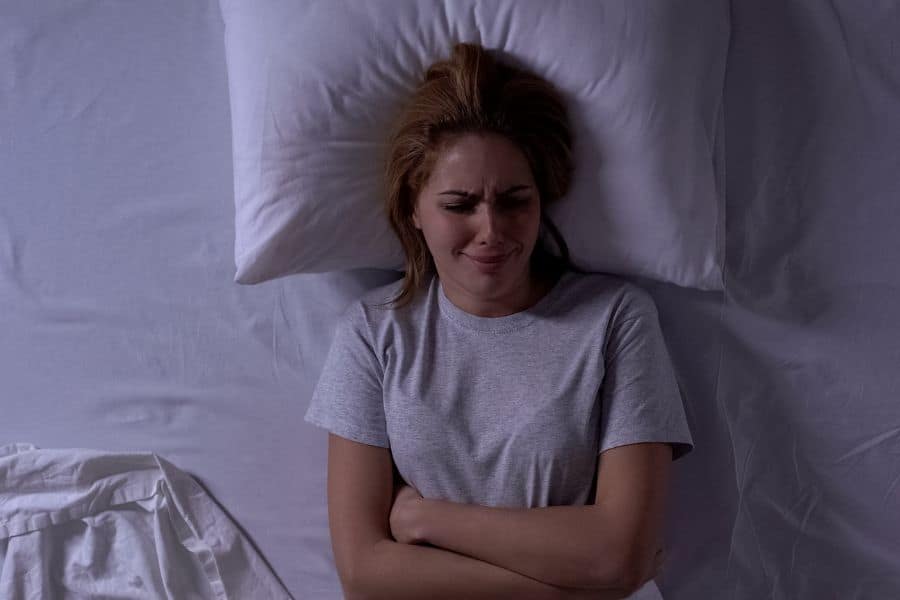It is late at night, and you turn in your bed, only to find out you are crying. But that is not the kicker; you were asleep the entire time and did not even remember how your pillow got soaked in tears. It can be quite terrifying.
Crying in your sleep is not a frequent occurrence in adults but is very common in babies. As much as it seems like an off phenomenon, crying in your sleep is a normal occurrence that rarely signals any cause for concern. The experience could mean many things – both positive and negative.
Reasons may be serious, like underlying medical conditions, mild, like a beautiful happy dream, or as terrifying as emotional trauma that leads to vivid depressing dreams, sleep terrors, or nightmares.
Crying in your sleep as an adult is rarely a serious issue that should cause you to worry. However, it is important to monitor the situation, especially when the crying is affecting your sleep hygiene.
How Is It Possible to Cry in Your Sleep?
Crying when sleeping or dreaming is not only possible but also quite frequent in those suffering from dementia, mental health conditions, and other effects of traumatic experiences. It happens to people of all ages, from babies to young adults and the elderly.
People can only cry in their sleep under a handful of circumstances:
1. Age: Babies vs. Adults
The reasons why babies cry in their sleep are not the same reasons why adults and elderly people do the same. All of this boils down to how the sleep cycle works.
There are various sleeping stages, all of which cause babies to cry from time to time as they move from one phase to another.
Babies do not dream till a certain age. However, babies are very proficient at crying in their sleep because their brains haven’t developed enough to smoothly transition from one sleep cycle to another.
There are only four sleep stages:
- The initial phase of the sleep cycle, known as Wake to sleep/N1, has a duration of 1 to 7 minutes. During this stage, the body experiences drowsiness while the brain activity slows down. Despite this, muscle movement is still possible, and breathing might become irregular. It is comparatively easier to wake up from this phase.
- Light Sleep/N2 follows the Wake to sleep/N1 phase and lasts between 10 to 25 minutes. In this stage, the heart rate and body temperature decline, and brain activity further decreases. It is relatively difficult to wake up from this phase, and nearly half of the sleep time is spent in this stage.
- The third stage, known as Deep Sleep/N3, takes place for 20 to 40 minutes. It is the most challenging phase to wake up from and offers many restorative advantages, including enhanced immune system efficiency, body recovery, and better creative thinking.
- Rapid Eye Movement (REM) sleep occurs about 10 to 60 minutes after falling asleep. During this phase, brain activity increases, temporary muscle paralysis takes place, and the eyes move rapidly under the lids. Dreams are more likely to occur during this phase, although they can also take place during other stages.
REM sleep is where babies spend most of their nights and is also where they are more susceptible to disturbances than adults. Since babies are in REM sleep most of the time and are easily disturbed during this phase, you can expect them to cry in their sleep as they rapidly transition from one sleep stage to another, trying to get proper rest.
As the baby gets older, their brains get more accustomed to the sleep cycle making the transition from one sleep cycle to another and so forth gradual and table.
So, if you notice your child is crying more often in their sleep, then you can rest assured that there is little to worry about. Take a look at the closed baby’s eyes; if they are moving rapidly under the eyelids as they sleep, then you know it is a normal occurrence.
2. Sleep Terrors
It is reassuring to know that children cry a lot in their sleep because of natural processes. However, this changes as they get older.
If you are a parent then you know that young age when your child had frequent nightmares that seemed to just come and go. Though relatively rare, sleep terrors, also called night terrors, happen mostly to children under the age of 12 years. Most frequent sleep terrors are reported in kids between ages 2 and 7.
Sleep terrors are bad dreams/experiences that happen during deep sleep and are never remembered. Symptoms range from waking up screaming, profound sweating, unease and distress in bed, screaming, sleepwalking, and also commonly, crying in your sleep.
The interesting part is that many people cry in their sleep; they just do not remember doing it. This is more so in serious cases like sleep terrors where the patient experiences the terrors during REM sleep, but because of the shift in sleep cycles, they end up waking up without any awareness of their cries.
If you notice someone else crying in their sleep and they do not seem to notice it, then it would be best to keep an eye on them, to monitor their progress since they cannot do so by themselves.
3. Underlying Medical Conditions e.g., Dementia
Patients who suffer from dementia and related illnesses like Alzheimer’s diseases cry in their sleep often. This is due to a number of several factors including physical causes like hunger and pain, external causes like noises and disturbances, or emotional causes like anxiety, depression, and loneliness.
4. Underlying Sleep Disorders e.g., Parasomnia
There are serious sleep disorders like parasomnia that can cause a patient to cry in their sleep. Parasomnia is a disorder where the patient experiences weird physical movements during sleep that may make someone think they are awake.
Such movements including crying in their sleep, screaming, sleep-waking, sitting up, eyes wide open but yet asleep, and eating or drinking while partially awake.
5. Mood Disorders e.g., Depression

Crying out of the blue with no defined reason is one of the well-defined signs of depression. It is important to note that crying in your sleep alone does not point to depression and it is advisable to seek a professional who can better see its correlation to other symptoms of depression.
Depression can also be presented in the form of low-energy mornings where you feel so down but find yourself getting more energetic as the day goes by. This is called a diurnal mood variation which is linked to the circadian rhythm that controls our sleep.
6. Effects of traumatic events e.g., stress & grief
Everyday life struggles as well as tragic circumstances in our lives can drive our emotions to the point of exhaustion and suppression. During sleep, our brains are less busy and that helps your brain address the feelings and emotions to keep you healthy.
Please reach out to a mental health professional as soon as you can to get to the bottom of your traumatic experiences. Crying in your sleep is your subconscious mind’s way of telling you to take care of your mental health.
7. Nightmares
Scientists have been able to note that nightmares play a huge role in emotional processing and help us to deal with stress and fearful circumstances.
Nightmares come about because of many reasons, including side effects of medications, stress, bad sleep hygiene, and poor mental health. Regardless, these horrifying dreams happen right at the edge of REM sleep, giving us a glimpse of imaginary worlds right before we wake up making them easier to remember.
This process helps the brain deal with difficult situations by merging the impossible world of the subconscious with the conscious mind. This helps us cope with tragedy, address suppressed emotions, and come up with new insights.
8. Effects of Medication
A lot of medications cause sleep disruptions and weird patterns in your sleep cycles. It is always best to take note of all the side effects of your medication before you take them.
Some may cause severe healthy changes, and cry in your sleep is just one of them. Please contact your doctor to change the medication or dosage.
Also Read: Keep Waking Up At 3am? Scientific & Spiritual Reasons
Step-by-Step Solution to Crying in Sleep
Knowing the neuroscience and psychology behind this phenomenon is going to help you discover the particular reason why you or your loved one is crying in their sleep.
As we have seen, there could be several causes of this, and it is up to you to take note of all the necessary details in order to narrow down the causes.
It would be best to start by taking a look at any underlying medical conditions before taking a look at the emotional aspects of the experience.
1. Pay Attention to the Scenarios
Get to know when you were crying, how you were crying, the feeling that made you cry (joy or sorrow), and so forth. If you are diagnosing someone else, then take note of their age, their mental state, their underlying medical, sleep, & mood disorders, as well as their emotional stability.
If you are waking up with tears in your pillows and sheets without knowing why, then you should note that you are crying in your sleep and not remembering.
Another important factor is dreams. What does it mean if you dreamt something and then woke up crying? Take note if it was someone else crying during the dream or you were the one crying.
According to dream interpretation, the dream has a different meaning if it was a stranger crying in the dream instead of a close loved relative or friend.
Please ensure you check up on those you see suffering in your dreams. It is always a bad omen if you do not because your subconscious is trying to warn you of the decisions you are making or a tragic event awaiting you in your future.
2. Copying With The Cause Of Crying In Sleep
Once you have identified the cause, go ahead and apply the following solutions to help alleviate the pain and disturbances that come with it:
- Underlying medical condition: a few remedies can help cope with conditions like dementia, for example, schedule appointments with a doctor, having a regular daily routine with walks and sunshine, practicing healthy sleep hygiene, healthy diet, less physical restraints, socializing, drug abstinence, and healthy environmental changes.
- Underlying sleep & mood disorders: ensure you seek professional help, take medication/prescriptions, talk to a friend or family, exercise, have a healthy diet, a proper sleeping schedule, and drug abstinence.
- Effects of medication: try getting off medication or having a change in the prescription to see if the crying stops when you go to sleep.
- Nightmares & sleep terrors: finding the solution to this problem is harder since it means you will have to dig deeper into your dreams, day-to-day stressors, and past traumatic experiences. This is where the importance of dream interpretation comes in. If you are feeling more stressed, scared, or terrified, then there is a good chance it will manifest in your sleep. Have a dream journal on your nightstand; it helps you take note of what your subconscious mind is trying to reveal and helps you address the issue.
Related: Why Am I Dreaming So Much All of a Sudden?
Final Thoughts
Crying in your sleep is no cause for concern, but it is advisable to take a look at the reasons why to figure out if you need a doctor’s help.
The sooner you figure out the cause, the faster the issue can be dealt with and help identify if there are any bigger underlying causes.
